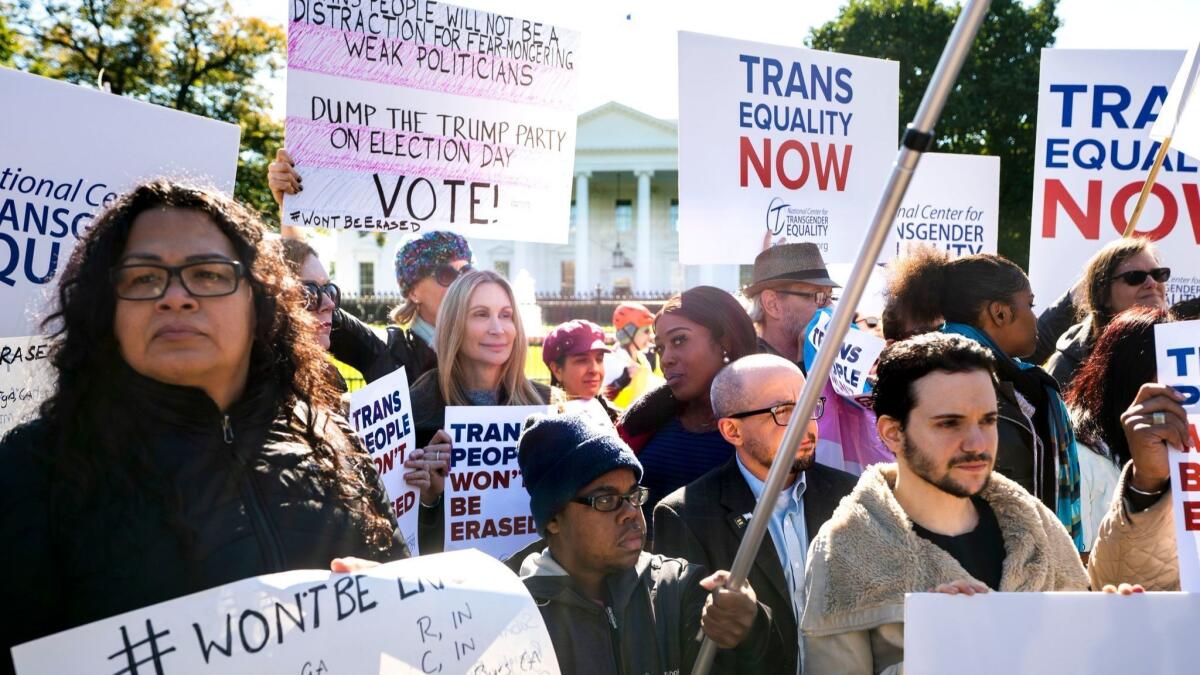Fury erupts over reported Trump administration plan to redefine gender and target civil rights protections for transgender people

- Share via
Reporting from Washington — LGBTQ leaders across the U.S. reacted with fury Monday to a report that the Trump administration is considering adoption of a new definition of gender that would effectively deny federal recognition and civil rights protections to transgender Americans.
“I feel very threatened, but I am absolutely resolute,” Mara Keisling, executive director of the National Center for Transgender Rights, said at a news conference convened by more than a dozen activist leaders. “We will stand up and be resilient, and we will be here long after this administration is in the trash heap.”
The activists, who spoke amid posters reading “#Won’tBeErased,” planned a protest march to the White House later in the day.
The Department of Health and Human Services acknowledged months ago that it was working to rewrite a federal rule that bars discrimination in healthcare based on “gender identity.” It cited a Texas-based federal judge’s opinion that the original rule went too far in concluding that discrimination based on gender identity is a form of sex discrimination, which is forbidden by civil rights laws.
On Sunday, the New York Times reported that the agency was circulating a memo proposing that gender be defined as an immutable biological condition determined by a person’s sex organs at birth. The election-year proposal would define sex as either male or female, and any dispute about one’s sex would have to be clarified through genetic testing, according to the Times’ account of the memo.
The department was terse in its response, saying it did not comment on “alleged leaked documents.” It did release a statement from Roger Severino, the head of its Office for Civil Rights, saying his agency was reviewing the issue while abiding by the 2016 ruling from the Texas-based federal judge, Reed O’Connor.
LGBTQ activists, who pledged legal challenges if the reported memo leads to official policy, said several other courts had issued rulings contrary to O’Connor’s.
“For years, courts across the country have recognized that discriminating against someone because they are transgender is a form of sex discrimination, full stop,” said Diana Flynn, Lambda Legal’s litigation director. “If this administration wants to try and turn back the clock by moving ahead with its own legally frivolous and scientifically unsupportable definition of sex, we will be there to meet that challenge.”
Shannon Minter, a transgender attorney with the National Center for Lesbian Rights, called the reported plan a “cynical political ploy to sow discord and energize a right-wing base” before the Nov. 6 election.
“The fact that the court ruling by a single federal district court judge was issued nearly two years ago only underscores the suspiciousness of this timing,” Minter said.
LGBTQ-rights leaders viewed it as the latest Trump administration attack on transgender Americans. Among the others are an attempt to ban them from military service; a memo from Atty. Gen. Jeff Sessions concluding that civil rights laws don’t protect transgender people from discrimination on the job; and the scrapping of Obama-era guidance encouraging school officials to let transgender students use school bathrooms that matched their gender identities.
According to Omar Gonzalez-Pagan, a lawyer with Lambda Legal, the proposed rule change appears to be undergoing White House review and would need to be signed off by the departments of Justice, Labor and Education, which are also involved with civil rights enforcement.
He said “the purpose of this rule is to erase transgender people from existence, to write them off from federal law, and to institute a definition that is contrary to case law, contrary to medical and scientific understanding, and contrary to the lived experience of transgender people.”
While social mores enter into the debate, medical and scientific experts have long recognized a condition called “gender dysphoria” — discomfort or distress caused by a discrepancy between the gender that a person identifies as and the gender at birth. Consequences can include severe depression. Treatment can range from sex-reassignment surgery and hormones to people changing their outward appearance by adopting a different hairstyle or clothing.
According to an estimate by the Williams Institute at the UCLA School of Law, there are about 1.4 million transgender adults in the United States.
More to Read
Sign up for Essential California
The most important California stories and recommendations in your inbox every morning.
You may occasionally receive promotional content from the Los Angeles Times.









